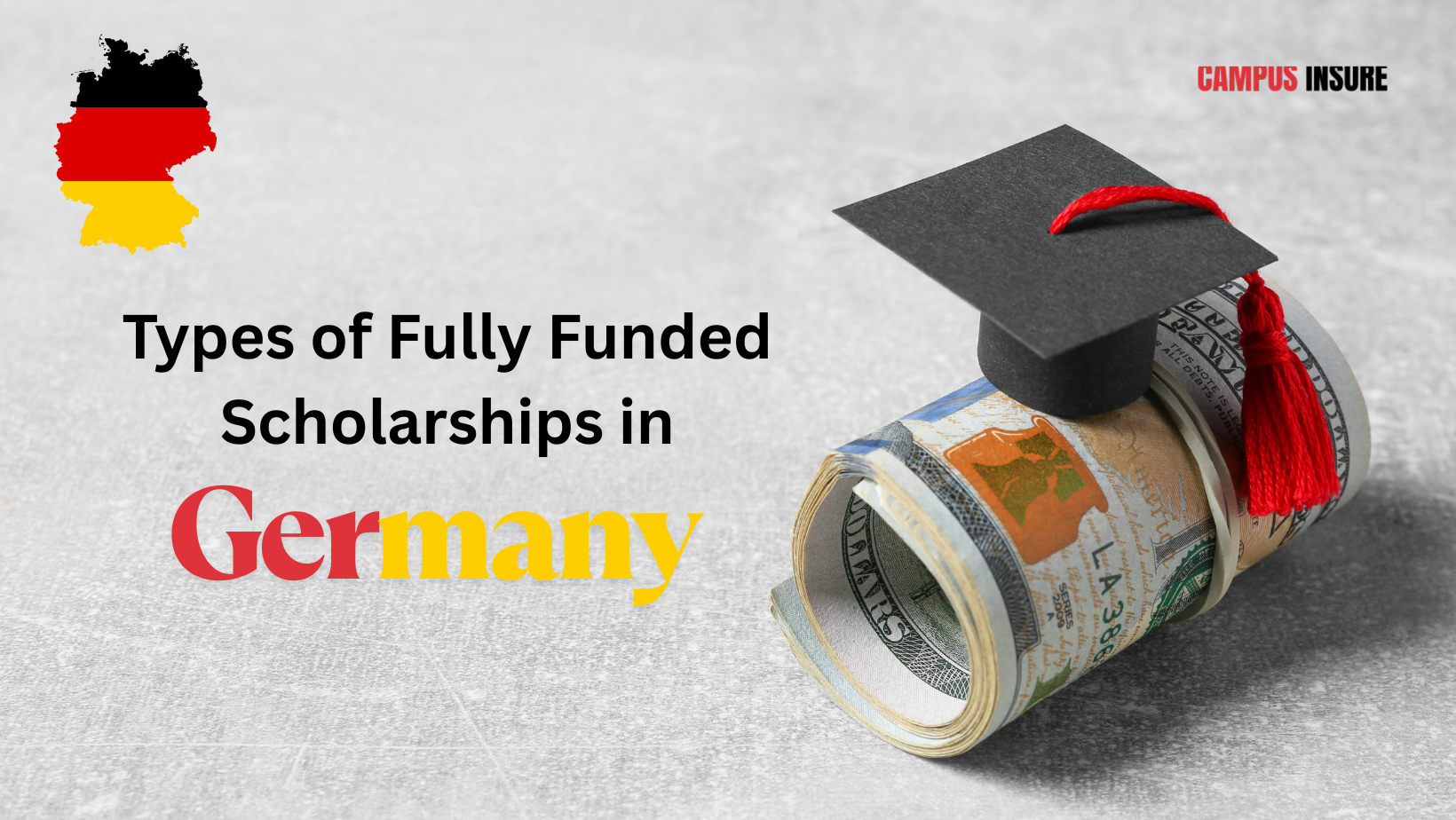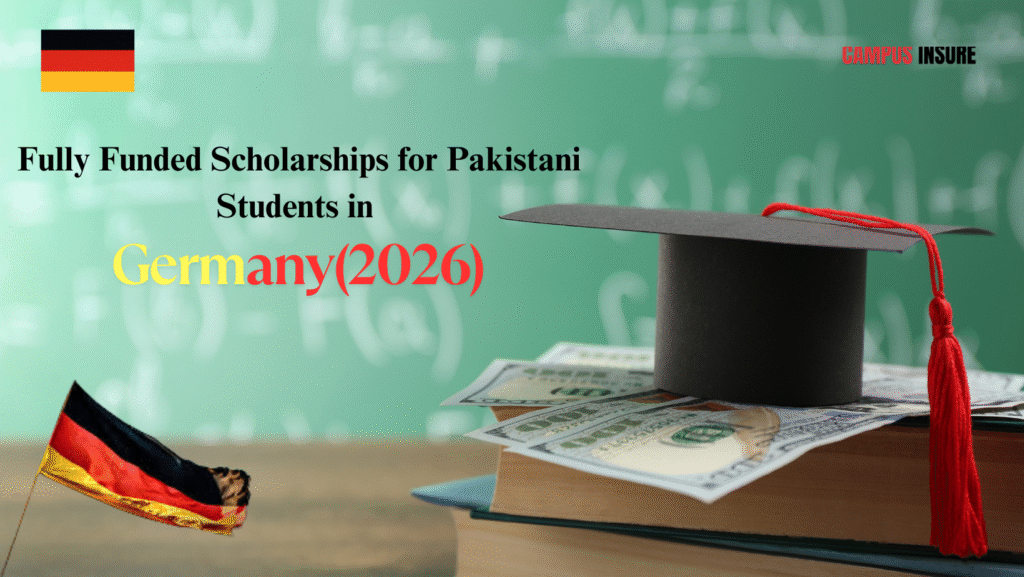Introduction – Why Germany is a Top Study Destination for Pakistani Students
Germany’s academic excellence, cultural diversity, and affordable education have made it a popular choice for Pakistani students.It helps international students with their financial burdens by providing a variety of fully funded scholarships.With changing global trends in education, Germany offers the best way to pursue high-quality postsecondary education without breaking the bank.
The Rising Popularity of Germany Among Pakistani Students
According to DAAD, over 8,000 Pakistani students were enrolled in German universities in 2024, up 12% from 2022.This upward trend is expected to last through 2026 and beyond.
Top reasons for this surge include:
- Free or inexpensive education: Even for foreign students, the majority of German public universities do not charge tuition.
- World-Class Education: Germany is home to a number of highly regarded universities, including LMU Munich, Heidelberg University, and the Technical University of Munich (TUM).
- Research Opportunities: With its outstanding research infrastructure, Germany is a world leader in engineering, technology, and the natural sciences.
- Internationally Recognized Degrees: German university degrees are highly valued in the labor market and are respected internationally.
- Opportunities for Employment After Graduation: International students are eligible to apply for an 18-month residency permit in order to begin looking for employment.
- Cultural Integration: Pakistani student associations and halal food options are just two examples of the welcoming environment Germany offers international students.
Why Focus on Fully Funded Scholarships?
Pakistani students still have to pay for living expenses, travel, and health insurance even though studying in Germany is less expensive than in the USA or the UK.Fully funded scholarships assist by paying for monthly stipends, travel, lodging, and tuition (if applicable).Health insurance and occasionally even family support may also be included.
Who Should Read This Guide?
This in-depth piece was written specifically for:
- Pakistani students presently enrolled in bachelor’s, master’s, or intermediate (FSc) programs
- Pakistani graduates looking to pursue postgraduate studies overseas
- Parents searching for trustworthy and secure options for their children to study abroad
- Education consultants and counselors assisting students with their studies in Germany
This guide provides comprehensive information on fully funded scholarships in Germany designed especially for Pakistani students for the academic year 2026, regardless of whether you’re a parent encouraging your child’s dream or a student with one of your own.

Types of Fully Funded Scholarships in Germany
Pakistanis and other international students at all academic levels can apply for a variety of scholarships offered by Germany. The best fully funded options are highlighted in this section along with their advantages, eligibility, and alignment with the objectives of Pakistani students.
1. DAAD Scholarships (Deutscher Akademischer Austauschdienst)
The DAAD (German Academic Exchange Service) is the largest funding organization in the world supporting international student exchange. For Pakistani students, DAAD offers numerous fully funded opportunities through different programs:
Popular DAAD Programs:
| Program Name | Level | Coverage | Deadline (Typical) |
|---|---|---|---|
| DAAD EPOS | Postgraduate | Tuition, €934/month stipend, travel, insurance | Aug–Oct |
| Helmut Schmidt (PPGG) | Master’s | Tuition, €934/month, insurance, travel | July |
| DAAD Research Grants | PhD/Postdoc | Full funding, monthly stipend, research support | Varies |
Benefits:
- Covers tuition fees (if applicable)
- Provides a monthly stipend for living costs
- Includes health insurance, travel allowance, and occasional family support
- Offers a German language course before the program begins
Target Fields:
- Development studies
- Public Administration and Policy
- Engineering and Technology
- Environmental and Sustainability Sciences
2. Erasmus Mundus Joint Master Degrees (EMJMD)
The Erasmus Mundus program is co-funded by the European Union and offers international students a chance to study in multiple countries, including Germany.
Key Features:
- Two to three European universities offer fully funded master’s programs.
- A monthly stipend between €1,000 and €1,200
- includes travel and setup costs.
- German is not necessary; English is typically accepted.
Notable Programs:
- EMJMD in Environmental Technology and Engineering (IMETE)
- Euroculture: Global Perspectives on Society, Politics, and Culture
- MSc in Smart Cities and Urban Communities
Benefits for Pakistani Students:
- Increased exposure in Europe
- Perfect for students who want to work throughout Europe
- prestigious and fiercely competitive
3. Heinrich Böll Foundation Scholarships
Around 1,200 students, including those from abroad, who demonstrate a strong commitment to social and political causes are supported annually by the Heinrich Böll Foundation.
Scholarship Inclusions:
- Includes full tuition coverage.
- The monthly stipend for master’s students is €934.
- includes additional funds for travel, family, and other expenses.
Eligibility:
- Excellent academic achievement
- Participation in environmental or social causes
- fervor for sustainable development and green politics
Preferred Fields:
- Environmental studies
- Renewable energy
- Political science
- Human rights
4. Konrad-Adenauer-Stiftung (KAS) Scholarships
International students who have a keen interest in politics and social development are the target audience for the KAS Scholarship.
Key Information:
- €861 for master’s students and €1,200 for doctoral students each month
- Family support and health insurance
- Networking, conferences, and seminars
Requirements:
- Above-average academic performance
- Engaged in student initiatives or volunteer work
- Proficiency in German (B2 level or above)
5. Friedrich Ebert Foundation (FES) Scholarships
The Friedrich Ebert Stiftung has a reputation for advancing social democracy. It provides international students, especially those from developing nations like Pakistan, with generous funding.
Scholarship Benefits:
- The entire cost of education
- Allowance per month
- Travel and medical costs
Requirements:
- Academic excellence
- Political consciousness or participation
- Social dedication
6. University-Specific Scholarships
Many German universities also provide their own internal scholarships for international students.
Examples:
| University | Scholarship Name | Amount / Coverage |
| Technical University of Munich (TUM) | TUM International Scholarship | €500–€1,500 one-time grant |
| University of Heidelberg | International Student Support Fund | Covers emergency needs |
| RWTH Aachen | Deutschlandstipendium | €300/month for 2 semesters |
Government & Private Exchange Programs
- Postdoctoral researchers at the Alexander von Humboldt Foundation
- International Postdoctoral Fellowship at Einstein
- Marie Curie Actions (for postdoctoral and doctoral researchers)
- Scholarships from the Bayer Foundation (for students studying science)
Final Thoughts on Scholarship Options
Since many scholarships require customized motivation letters and early preparation, Pakistanis applying to Germany in 2026 should do their homework and create a shortlist as soon as possible. Always submit more than one scholarship application, and use alumni networks or educational consultants.
Eligibility Criteria & Required Documents
Before applying for fully funded scholarships in Germany, Pakistani students must understand and meet a set of eligibility requirements. These include academic performance, language proficiency, work experience (if applicable), motivation, and a collection of essential documents. This part aims to break down each criterion in detail and equip students with a checklist to prepare a complete, competitive application.
General Eligibility Criteria for Pakistani Students
Although the terms of each scholarship may vary, German scholarship providers typically require the following general requirements:
1. Academic Qualifications
- Bachelor’s degree (for Master’s scholarships)
- Master’s degree (for PhD scholarships)
- Degree must be recognized by the Higher Education Commission (HEC) of Pakistan
- For DAAD EPOS: Minimum 2 years of work experience is often required
2. Academic Performance (Grades)
| Grade Type | CGPA Requirement (4.0 Scale) | Equivalent % (Pakistani Scale) |
|---|---|---|
| Excellent | 3.7+ | 85–100% |
| Very Good | 3.3–3.6 | 75–84% |
| Good (Minimum) | 2.7–3.2 | 60–74% |
3. Language Proficiency
Students must demonstrate fluency in either German or English, depending on the course or scholarship:
For English-Taught Programs:
- IELTS: A minimum score of 6.5 overall (some programs may require 7.0).
- TOEFL iBT: At least 88–95
- Letters of Medium of Instruction (MOI) are not preferred, but they are occasionally accepted.
For German-Taught Programs:
- TestDaF: Level 4 across the board
- Level 2 or 3 DSH
- B2 or C1 Goethe-Zertifikat
| Test Name | Minimum Score | Validity |
| IELTS | 6.5 – 7.5 | 2 years |
| TOEFL iBT | 88 – 100 | 2 years |
| TestDaF | 4 x 4 | Unlimited |
| Goethe B2/C1 | Passed | 2–3 years |

Required Documents Checklist
Several documents must be put together in a polished, well-organized manner to make up a complete application. Here is a typical list:
1. Academic Transcripts & Degree Certificates
It needs to be notarized and translated into German or English.
HEC and IBCC attestation (for intermediate/bachelor’s degree
Curriculum Vitae (CV)
- Make use of the Europass CV format, which is the norm throughout Europe.
- Add your education, internships, professional experience, languages, and abilities.
- Emphasize extracurricular pursuits or interpersonal interactions.
3. Motivation Letter / Statement of Purpose (SOP)
This is one of the most critical components. It should:
- Be between 500 and 1,000 words long.
- Explain why you chose that specific course and Germany.
- Describe your career goals.
- Describe your qualifications for the scholarship.
4. Recommendation Letters (2-3)
- From instructors at universities or managers at work
- It needs to be recent within the last six months.
- Signed and printed on official letterhead
5. Language Test Results
- IELTS, TOEFL, TestDaF, Goethe, etc.
- Attach original score report with your application
6. Experience Certificates (If Required)
- For DAAD EPOS, work experience of 2 years is mandatory
- Should be on company letterhead, with joining and leaving dates
7. Research Proposal (For PhD Applications)
- 5–10 pages of a thorough proposal summary:
- Question for research
- Objectives
- Methodology
- Timeline
- Supervisor (if identified)
8. Passport Copy
- Valid for the duration of study
- First two pages (bio-data and address)
9. Photograph (Passport-Size)
- White background, 35mm x 45mm, high resolution
10. Scholarship-Specific Application Forms
- Downloaded from DAAD, Erasmus, or foundation websites
- Fill out digitally (no handwritten forms unless required)
Formatting Guidelines
| Document | Format | File Type | Notes |
| CV | Europass | No more than 2 pages | |
| Motivation Letter | Formal, essay | Signed at the end | |
| Transcripts | Official copy | Scanned PDF | Certified English/German version |
| Recommendations | Official letter | Must be signed + stamped |
Application Optimization Tips
Start Early: Eight to ten months prior to the start of the course, many scholarships close.
Customize Every Application: Avoid using a general SOP for every application.
Proofread and polish: Poor grammar can make your application fail.
Use the Europass editor, Hemingway, and Grammarly as tools.
Attend Info Sessions: Free webinars are frequently held
Common Mistakes to Avoid
| Mistake | Why It Hurts Your Chances |
| Submitting incomplete documents | Leads to automatic disqualification |
| Ignoring the motivation letter | Weakens your personal profile |
| Applying for unrelated programs | Shows lack of clarity and focus |
| Not following formatting rules | Appears unprofessional |
| Sending documents too late | Misses deadlines, no consideration |
Tools & Resources
- Europass Resume Builder
- DAAD Pakistan
- Practice Exams for IELTS
- Official TOEFL Website
Step-by-Step Application Process (Simplified)
Applying for a fully funded scholarship in Germany involves these main steps:
1. Research Scholarships
Make use of resources such as the Erasmus Mundus Catalogue, the DAAD Scholarship Database, and foundation websites (e.g., KAS, FES). Compare according to your field, eligibility, and language requirements.
2. Choose Courses & Universities
Match scholarships to courses at prestigious universities in Germany. Examine course structures and university reputations using DAAD Course Finder.
3. Register on Portals
Make accounts on university application platforms (e.g., Uni-Assist), Erasmus project websites, and portals such as DAAD.
4. Prepare Documents
Translate and scan required documents such as:
- Transcripts of academic work
- CV in the format of Europass
- Letter of motivation
- Letters of recommendation
- Results of language tests
- A copy of your passport
5. Submit Application
Complete online forms carefully, attach all supporting documentation, and submit on time.
6. Interview Preparation
Interviews are required for certain scholarships. Practice questions about your objectives, why you chose Germany, and how you will affect society.
7. Visa Process
Once selected, apply for a German student visa at the German Embassy or Consulate. Provide your proof of income, health insurance, scholarship letter, and passport.
Conclusion & Recap
For Pakistani students looking for a top-notch education without the financial strain of studying overseas, Germany stands out as a beacon of opportunity. High-quality degrees, tuition-free public universities, innovative research, and inclusive multicultural experiences make Germany a top destination, as evidenced by the growing number of students enrolling each year.
In this journey, fully funded scholarships are a game-changer. Whether provided by DAAD, Erasmus Mundus, Heinrich Böll or KAS foundations, or directly through German universities, these scholarships enable worthy Pakistani students to reach their full academic potential without having to worry about living expenses, tuition, or travel costs.
What is the best fully funded scholarship for Pakistani students in Germany?
Because of their extensive subject coverage and complete financial support, the DAAD Scholarships particularly the EPOS and Helmut Schmidt programsare among the most well-liked and dependable choices for Pakistani students.
Do I need to know the German language to apply?
Not all the time. English is the language of many degree programs and scholarships, particularly at the Master’s and PhD levels. However, basic German (B1/B2) is either required or advised for everyday use and for certain specialized scholarships (like KAS).
What are the living expenses for a student in Germany?
For living expenses, students typically require between €850 and €1,000 per month. These expenses are usually covered by monthly stipends for fully funded scholarships.
Can I apply for multiple scholarships at once?
Indeed! To improve your chances, it is actually strongly advised to apply for several scholarships. Just be sure that every application is customized for the particular program.
When should I start applying for 2026 intake?
Prepare your documents and begin your research at least eight to ten months in advance. The majority of the Fall 2026 intake deadlines will occur in August through December of 2025.
